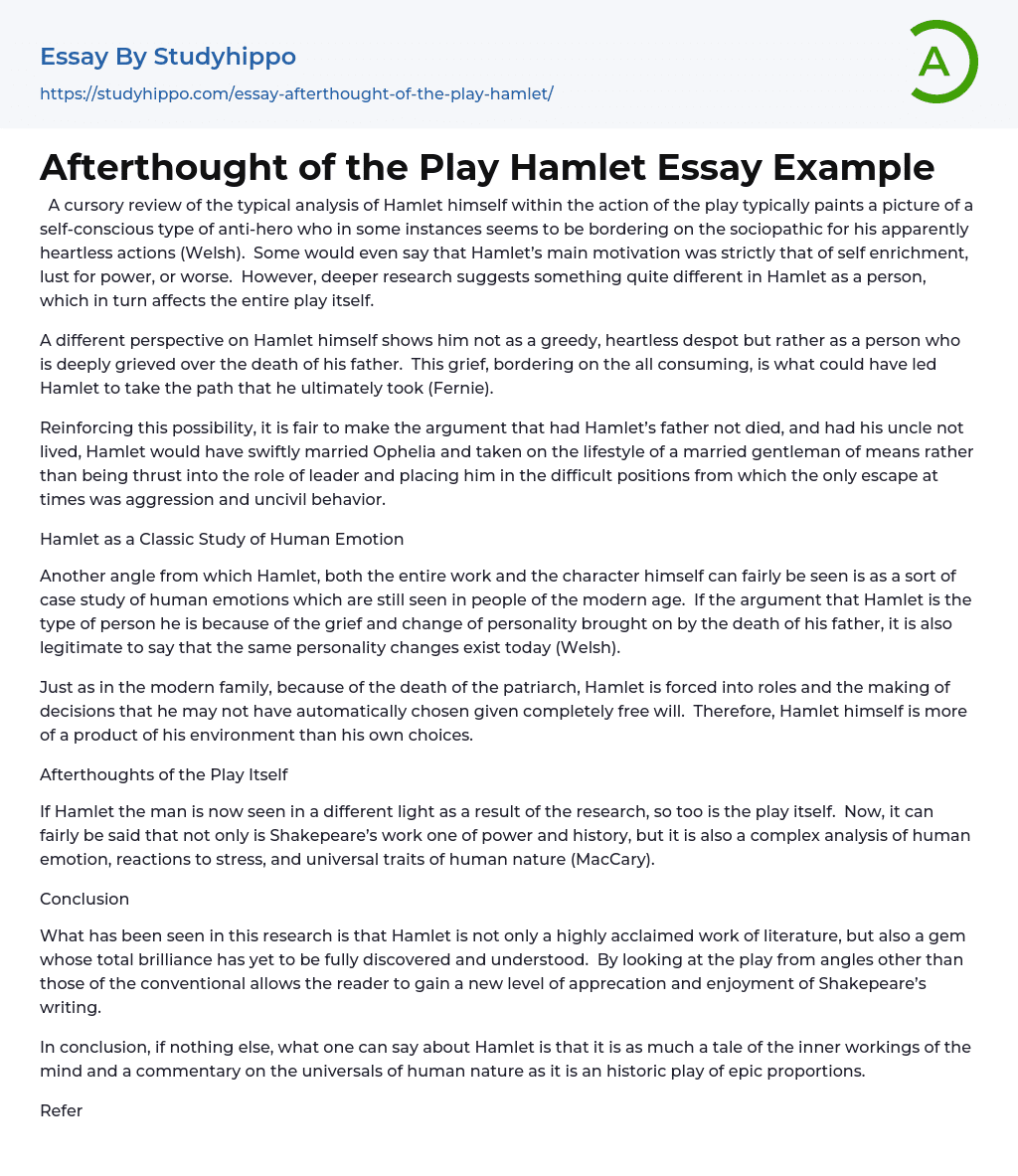Although often depicted as a self-aware anti-hero with sociopathic tendencies and unfeeling behavior, Hamlet's character in the play exhibits another side that ultimately shapes the story (Welsh). Some arguments propose that his primary motivation is entirely self-centered, driven by a desire for power or even something more sinister. Nonetheless, upon closer examination, Hamlet's character reveals intricacies that greatly influence the overall narrative.
According to Fernie, Hamlet is not portrayed as a greedy and heartless ruler, but rather as someone who is deeply saddened by his father's death. This overwhelming grief may have influenced Hamlet's actions throughout the play.
To support this idea, it is reasonable to argue that if Hamlet's father had not died and his uncle had not lived, Hamlet would have married Ophelia quickly and lived the
...life of a prosperous married man. Instead, he was forced into a position of leadership, facing challenging situations that sometimes led him to be aggressive and uncivil.
Hamlet as a Classic Study of Human Emotion
According to Welsh, Hamlet and the play convey a different viewpoint on human emotions that remains pertinent in contemporary society. The grief and altered demeanor exhibited by Hamlet stem from his father's demise, a sentiment that is similarly applicable to people today.
Due to the death of the patriarch, Hamlet is compelled to assume certain roles and make decisions that he may not have necessarily chosen if he had complete freedom. As a result, Hamlet's actions are influenced more by his surroundings rather than his own volition.
Afterthoughts of the Play Itself
The research findings have
provided new understanding of both Hamlet's character and the play itself. It is now clear that Shakespeare's work holds historical importance and has a profound examination of human emotions, responses to stress, and universal aspects of human nature (MacCary).
Conclusion
In summary, Hamlet can be described as a story that explores the complexities of the human mind and serves as a reflection on universal aspects of human nature. Additionally, it is a monumental theatrical production with historical significance.
References
- Fernie, Ewan. Shame in Shakespeare. London: Routledge, 2002.
- MacCary, W. Thomas. Hamlet A Guide to the Play. Westport, CT: Greenwood Press, 1998.
- Welsh, Alexander. Hamlet in His Modern Guises. Princeton, NJ: Princeton University Press, 2001.
- Pressure essays
- Confidence essays
- Disgrace essays
- Lost essays
- Harmony essays
- Fairness essays
- Sarcasm essays
- Respect essays
- Responsibility essays
- Empathy essays
- Suffering essays
- Suspense essays
- Fear essays
- Feeling essays
- Loneliness essays
- Ambition essays
- Tolerance essays
- Hope essays
- Inspiration essays
- Kindness essays
- Shame essays
- Desire essays
- Doubt essays
- Grief essays
- Hate essays
- Laughter essays
- Passion essays
- Pride essays
- Forgiveness essays
- Happiness essays
- Humanity essays
- Loyalty essays
- Guilt essays
- Honesty essays
- Betrayal essays
- Need essays
- Boredom essays
- Courage essays
- Regret essays
- Anger essays
- Honor essays
- Honesty Is The Best Policy essays
- Prince Hamlet essays
- Hamlet Madness essays
- John Locke essays
- 9/11 essays
- A Good Teacher essays
- A Healthy Diet essays
- A Modest Proposal essays
- A&P essays




